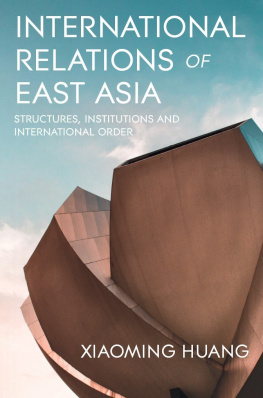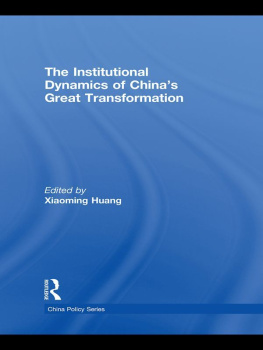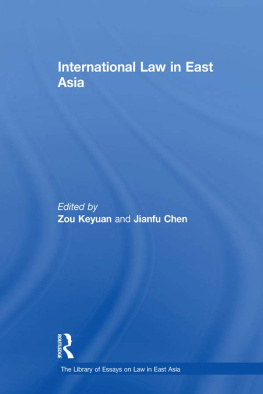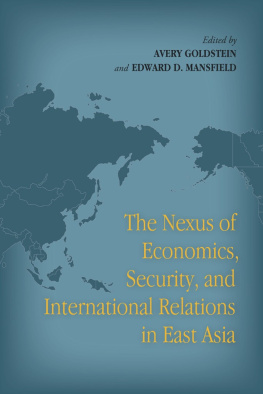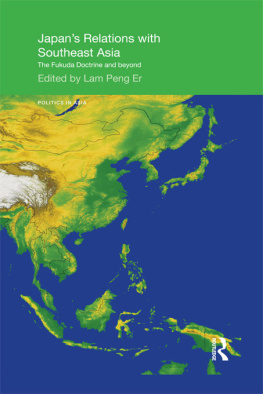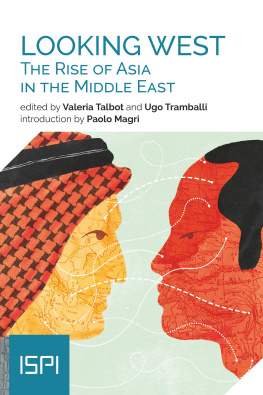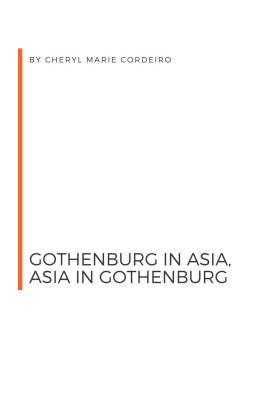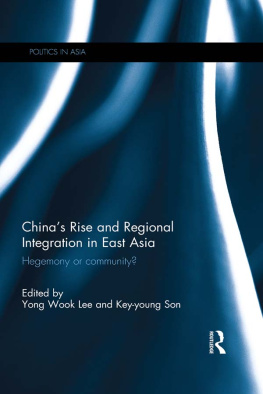Xiaoming Huang - International Relations of East Asia
Here you can read online Xiaoming Huang - International Relations of East Asia full text of the book (entire story) in english for free. Download pdf and epub, get meaning, cover and reviews about this ebook. publisher: Macmillan Education UK, genre: Politics. Description of the work, (preface) as well as reviews are available. Best literature library LitArk.com created for fans of good reading and offers a wide selection of genres:
Romance novel
Science fiction
Adventure
Detective
Science
History
Home and family
Prose
Art
Politics
Computer
Non-fiction
Religion
Business
Children
Humor
Choose a favorite category and find really read worthwhile books. Enjoy immersion in the world of imagination, feel the emotions of the characters or learn something new for yourself, make an fascinating discovery.
- Book:International Relations of East Asia
- Author:
- Publisher:Macmillan Education UK
- Genre:
- Rating:4 / 5
- Favourites:Add to favourites
- Your mark:
- 80
- 1
- 2
- 3
- 4
- 5
International Relations of East Asia: summary, description and annotation
We offer to read an annotation, description, summary or preface (depends on what the author of the book "International Relations of East Asia" wrote himself). If you haven't found the necessary information about the book — write in the comments, we will try to find it.
International Relations of East Asia — read online for free the complete book (whole text) full work
Below is the text of the book, divided by pages. System saving the place of the last page read, allows you to conveniently read the book "International Relations of East Asia" online for free, without having to search again every time where you left off. Put a bookmark, and you can go to the page where you finished reading at any time.
Font size:
Interval:
Bookmark:

With exceptional skill and deep understanding of the region, Xiaoming Huang offers a very fine study of international relations in East Asia. Analytically insightful and theoretically rich, this book is highly recommended for all students of East Asian studies: it will have a long lifespan on our bookshelves. East Asian IR have undergone fundamental transformation and the region is exceptionally important for global politics, international security and in predicting future patterns of global governance.
Weixing Hu, University of Macau
This is a much needed and anticipated book on a timely and important topic: the International Relations of East Asia. Huang provides a comprehensive look on the IR of East Asia by thoroughly examining various issues of history, security, geopolitics, political economy, domestic politics, culture, and transitional challenges.
Hun Joon Kim, Korea University
This major new text finally does justice to the field of international relations of East Asia, by highlighting their inherent peculiarities and dynamism. The volume represents an insightful investigation into East Asias acquired centrality in global politics, economy and governance and is a refreshing and powerful contribution. Highly recommended.
Antonio Fiori, University of Bologna
This excellent, comprehensive textbook on international relations of East Asia is written from a truly East Asian perspective and based on many years teaching experience in this field. I recommend it to both undergraduate and postgraduate students new to the region.
Fumihito Gotoh, University of Warwick
In this fascinating book, Xiaoming Huang treats the international relations of East Asia as a distinct subject, and embarks on a theoretically innovative and empirically rich study of its various aspects. Realpolitik, rapid industrial growth, and bifurcated cultural identities are seen as the driving forces behind the IREA, shaping the institutions and international order prevalent in the region, and leading to possible development of a new system. No one can understand the world today, a time of US-PRC competition, without understanding the IREA. Huangs book is a must for such understanding.
Yu-Shan Wu, National Taiwan University
An excellent text which provides a highly readable, comprehensive and theoretically-grounded introduction to the international relations of East Asia. Superbly applying theories of international relations to East Asian practice, Xiaoming Huang illustrates admirably how geopolitical, institutional and civilizational forces have jointly shaped the evolving international order of a region that matters hugely to the future of the world.
Jian Zhang, University of New South Wales, Canberra
International Relations of East Asia is a comprehensive source of knowledge on the patterns and logic of interstate interactions in one of the most important regions of the world. It is unique in that it considers international relations of East Asia as a domain in its own right.
Alexander Korolev, University of New South Wales, Sydney
A remarkable text that brings together both the rich past traditions and most recent scholarship on East Asia to provide a comprehensive survey of the development of the region. The volume integrates the intersecting perspectives of power politics, culture and political economy. The result is a book that will be of central importance and use to students and researchers of the East Asian region for many years to come.
Christopher Hughes, University of Warwick
This well-structured text has excellent teaching strategies and is built on the latest research. It offers a brilliant introduction to the increasingly complex international relations of East Asia and the impact of the events of that region on global affairs.
Niall Duggan, University College Cork
International Relations of East Asia offers a compelling account that captures intelligently the complexity of structural and institutional changes of East Asian international order since the end of World War II. Theoretically informed, it adds valuable alternative perspectives in understanding the dynamics of East Asian international relations today.
Yongjin Zhang, University of Bristol
This is the most comprehensive text on East Asia and its international relations. The book not only examines the topic with a carefully developed theoretical framework, but also explains clearly the complexities of the region. This is a very well written book for readers to understand the past, the present and the future of East Asia.
Jing Men, College of Europe
RELATIONS OF
EAST ASIA
Structures, Institutions
and International Order
Xiaoming Huang

Xiaoming Huang, under exclusive licence to Springer Nature Limited 2020
All rights reserved. No reproduction, copy or transmission of this publication may be made without written permission.
No portion of this publication may be reproduced, copied or transmitted save with written permission or in accordance with the provisions of the Copyright, Designs and Patents Act 1988, or under the terms of any licence permitting limited copying issued by the Copyright Licensing Agency, Saffron House, 610 Kirby Street, London EC1N 8TS.
Any person who does any unauthorized act in relation to this publication may be liable to criminal prosecution and civil claims for damages.
The author has asserted his right to be identified as the author of this work in accordance with the Copyright, Designs and Patents Act 1988.
First published 2020 by
RED GLOBE PRESS
Red Globe Press in the UK is an imprint of Springer Nature Limited, registered in England, company number 785998, of 4 Crinan Street, London, N1 9XW.
Red Globe Press is a registered trademark in the United States, the United Kingdom, Europe and other countries.
ISBN 978-1-352-00872-2 hardback
ISBN 978-1-352-00868-5 paperback
This book is printed on paper suitable for recycling and made from fully managed and sustained forest sources. Logging, pulping and manufacturing processes are expected to conform to the environmental regulations of the country of origin.
A catalogue record for this book is available from the British Library.
A catalog record for this book is available from the Library of Congress.
I wanted to write a book on international relations of East Asia 25 years ago when I first started teaching the subject at the School of International Relations at the University of Southern California (USC) in Los Angeles, before I moved on to spend a year as a visiting fellow at the Program of International Politics and Economy at the East-West Center in Honolulu. Professor James Rosenau, then at USC, stimulated my interest in the theory and practice of international relations in East Asia or simply in the possibility of such a field of inquiry. Jims intense curiosity, almost like that of a philosopher, inspired me to take this journey of intellectual exploration. Are IREA an instance of how international relations work? Is there a pattern of repeated occurrence of certain types of state action, behavior, and relations in IREA? If so, what shapes such a pattern? Do these forces transcend East Asia? And will the pattern persist?
Next pageFont size:
Interval:
Bookmark:
Similar books «International Relations of East Asia»
Look at similar books to International Relations of East Asia. We have selected literature similar in name and meaning in the hope of providing readers with more options to find new, interesting, not yet read works.
Discussion, reviews of the book International Relations of East Asia and just readers' own opinions. Leave your comments, write what you think about the work, its meaning or the main characters. Specify what exactly you liked and what you didn't like, and why you think so.

